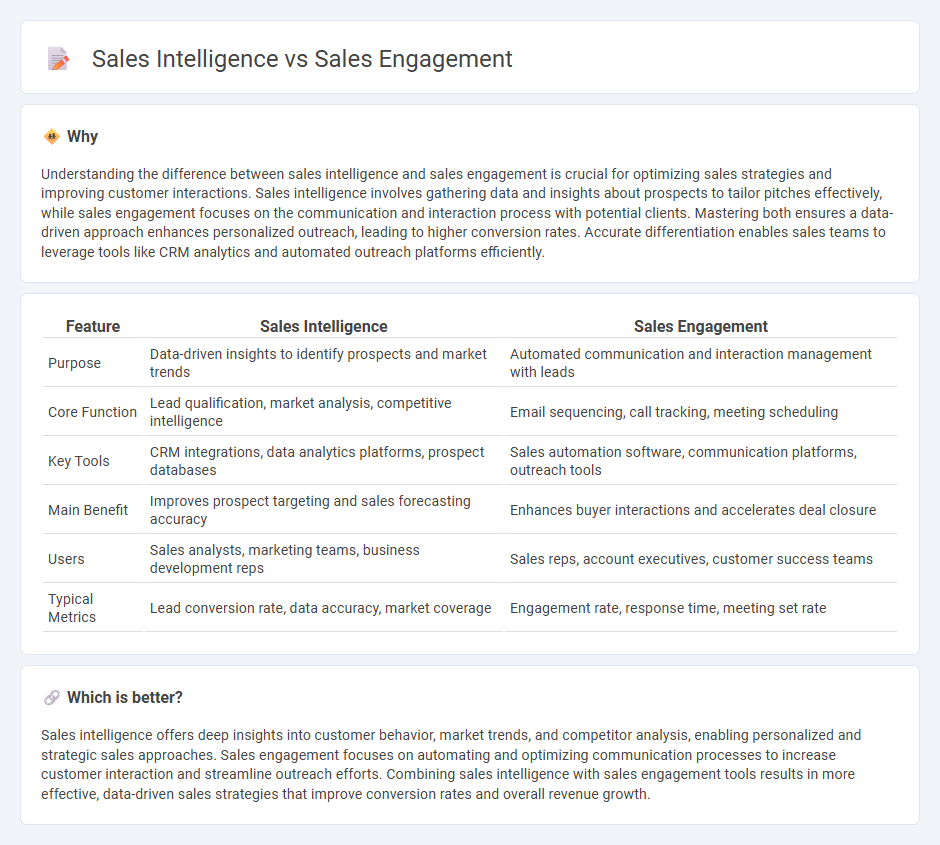
Sales intelligence leverages data analytics and market insights to identify potential leads, understand customer behavior, and optimize targeting strategies, enhancing decision-making and sales efficiency. Sales engagement focuses on the direct interaction between sales teams and prospects through personalized communication, follow-ups, and relationship management to drive conversions. Explore the differences and benefits of sales intelligence and sales engagement to boost your sales performance.
Why it is important
Understanding the difference between sales intelligence and sales engagement is crucial for optimizing sales strategies and improving customer interactions. Sales intelligence involves gathering data and insights about prospects to tailor pitches effectively, while sales engagement focuses on the communication and interaction process with potential clients. Mastering both ensures a data-driven approach enhances personalized outreach, leading to higher conversion rates. Accurate differentiation enables sales teams to leverage tools like CRM analytics and automated outreach platforms efficiently.
Comparison Table
| Feature | Sales Intelligence | Sales Engagement |
|---|---|---|
| Purpose | Data-driven insights to identify prospects and market trends | Automated communication and interaction management with leads |
| Core Function | Lead qualification, market analysis, competitive intelligence | Email sequencing, call tracking, meeting scheduling |
| Key Tools | CRM integrations, data analytics platforms, prospect databases | Sales automation software, communication platforms, outreach tools |
| Main Benefit | Improves prospect targeting and sales forecasting accuracy | Enhances buyer interactions and accelerates deal closure |
| Users | Sales analysts, marketing teams, business development reps | Sales reps, account executives, customer success teams |
| Typical Metrics | Lead conversion rate, data accuracy, market coverage | Engagement rate, response time, meeting set rate |
Which is better?
Sales intelligence offers deep insights into customer behavior, market trends, and competitor analysis, enabling personalized and strategic sales approaches. Sales engagement focuses on automating and optimizing communication processes to increase customer interaction and streamline outreach efforts. Combining sales intelligence with sales engagement tools results in more effective, data-driven sales strategies that improve conversion rates and overall revenue growth.
Connection
Sales intelligence enhances sales engagement by providing actionable insights on customer behavior, preferences, and market trends. Leveraging data analytics and CRM integration, sales teams can tailor their outreach strategies to increase relevance and response rates. This connection drives higher conversion rates and optimizes overall sales performance.
Key Terms
Communication Channels
Sales engagement platforms prioritize optimizing communication channels such as email, phone calls, and social media to foster direct interactions with prospects and clients. Sales intelligence tools gather and analyze data from multiple sources, including CRM systems and social media insights, to provide actionable information that refines messaging strategies across these channels. Explore in-depth how integrating sales engagement with sales intelligence enhances communication effectiveness and boosts revenue.
Data Analytics
Sales engagement platforms optimize customer interactions by leveraging data analytics to track communication patterns, response rates, and engagement metrics, enabling personalized outreach strategies. Sales intelligence tools gather and analyze market, prospect, and competitor data to provide actionable insights, helping sales teams identify opportunities and optimize pipeline management. Explore the latest advancements in data analytics to enhance both sales engagement and intelligence strategies effectively.
Buyer Intent
Sales engagement platforms enhance communication by tracking buyer interactions and automating personalized outreach to increase conversion rates. Sales intelligence tools gather data from multiple sources to analyze buyer intent, providing insights that help prioritize leads and tailor sales strategies effectively. Explore how integrating both approaches can optimize your sales performance and better align efforts with buyer intent.
Source and External Links
What Is Sales Engagement? A Complete Guide for Sales Leaders - Sales engagement encompasses all interactions between a salesperson and a prospect throughout the sales cycle, focusing on building meaningful customer relationships and driving conversions by using the right strategy and tools to improve communications and results.
Sales engagement: How to best connect with buyers - Seismic - Sales engagement is the communication between sales reps and buyers that, when optimized with personalized content and the right channels, increases conversions and aligns sales efforts with buyer expectations to boost revenue.
Sales Engagement: The Definitive Guide for Platform Selection - Sales engagement refers to all types of interactions sellers have with prospects and customers, with an increasing emphasis on platforms that help scale high-quality engagements to improve conversion rates and deal sizes.
 dowidth.com
dowidth.com